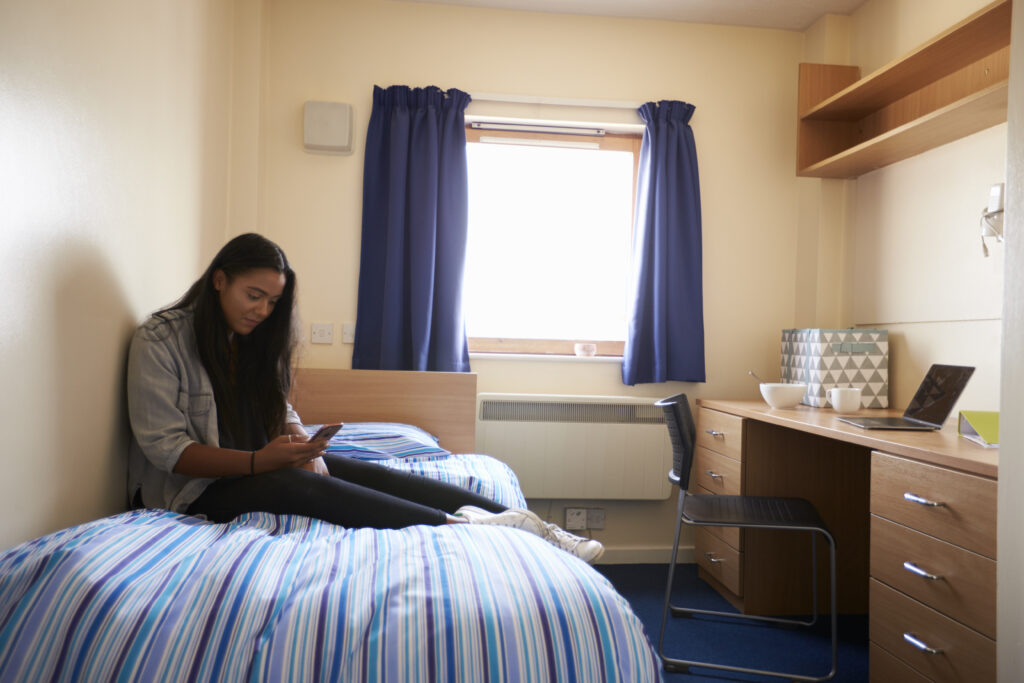Where you live makes a huge impact on the quality of your student experience. The friends you make in the first year are frequently the ones you keep, and where you live plays a large part in meeting them. Accommodation is expensive; it is difficult to over-estimate the impact of your accommodation on your total student budget.
Most universities house you for the first year – although some have very little accommodation and a very few universities (for example, Oxford and Cambridge) house almost all students for their whole course. There may be university halls (on or off campus), university-owned or managed local houses or other properties, some universities sub-contract student housing to a private company, use local private halls or private-sector housing – or a mixture of all of these.

University Accommodation
Go for living in university housing if you can. Standards and rents vary but it is easier to make friends, you have more clout with the landlord and it may be closer to the students’ union and teaching areas.
What is Available?
Usually you have a choice of rooms in different halls at different rents. Traditional halls are based on corridors; modern halls are usually clustered in flats and some rooms may have en-suite bathrooms (although the rent will be higher than for a shared room in a 1960s block). Most university accommodation is self-catered but catered halls are an option at some universities.
Check the university profiles in the University Search for a summary of what each university offers and the university website for detailed descriptions of each hall of residence. Go and see the accommodation you are applying for, if at all possible. And find out what is supplied before you arrive and what you need to bring for example, your own bedding.
How much will it cost?
From around 55 pounds a week for something basic in a cheap area, to 120 pounds per week for an en-suite room with broadband connection in swish new halls somewhere pricier. The university profiles (see the University Search) tell you how much (roughly) it costs at each university and, crucially, how many weeks your contract runs for.

You may have a term-time contract (perhaps having to move out over the Christmas and Easter vacations), which is fine if you have a home to go to in the holidays. Other contracts are for the 36-40 weeks of the academic year (best if you want a base for most of the year and plan to travel in the summer). Some are for the full 52 weeks – a must for those with a family or with no other home but a great waste of money for others.
How do you apply for student accommodation?
It usually involves filling in yet another form – increasingly online. And you may be asked to write a short personal statement or answer questions (for example, about your interests or whether you smoke) so the accommodation office can attempt to group compatible students together. Make sure you get your application in well before the closing date – some accommodation is allocated on a first-come-first-served basis.
Private Accommodation
In some cities with lots of students, there are commercial student halls managed by private companies for example, Unite. They are usually central and purpose-built, and you may share with students from a number of other universities in the city.
Renting a student house/flat
When you need to rent privately, the university accommodation service will almost certainly help and, if you are lucky, may also have vetted the accommodation on its lists. Colleges without first-year accommodation sometimes organise ‘housing days’, where new students come and meet each other and local estate agents to sort out house-shares. There is much information about local prices on our university profiles; also look at some of the national websites covering major student cities (studentpad). (accommodationforstudents); and for London, try the joint London universities’ site, studenthousing.lon.

Cheap rented accommodation is harder to find in leafy suburbs or holiday areas (where term starts before the holidaymakers go home). Self-catering accommodation is usually cheaper, so long as you know how to feed yourself cheaply. Remember to add in the travel costs when assessing rents (no point in something dirt cheap if it costs a fortune getting to lectures).
There is a lot to think about when looking at accommodation (and you must look). Here are a few
pointers to start you off.
– Security – is it in an area where you will be able to get burglary insurance; is it on a bus/tube route; and will you feel safe walking home from your nearest stop?
– Electricity/gas/water safety – sockets, pipes, wiring and appliances – do they look safe and regularly serviced? Particularly look at gas water heaters and fires; landlords now have to have gas appliances serviced annually and provide you with proof of this. (If you are concerned about a gas appliance, the Health and Safety Executive runs a carbon monoxide advice line, 0800 300 363 or via the website)
– Fire safety – smoke alarms, exits, windows and doors.
– Damp – any sign of it? Ventilation.
– Vermin and pests – signs, smell etc.
– TV licence – has it been paid? If not, it is legally down to you.
Get yourself sorted before the start of term if you possibly can; you will be at a long-term disadvantage if the course starts while you are still sleeping on friends’ floors.

Living at Home
If it’s close enough, it will almost certainly be cheaper to live at home. But you may miss out on some of the social facilities and be less involved in student life. You should move out if you do not have proper study facilities – a room of your own as a start.
Buying
Some mortgage companies have special packages for students who can afford to buy a flat or house and sublet rooms. You may need a parent to act as guarantor. Alternatively, some parents find that buying a house or flat is the most cost-effective way of making their parental contribution.
Student Book [http://www.studentbook.org/] is a website for prospective and current students. It offers a university comparison tool and a wealth of information on the ins and outs of applying to university. The site is also a guide to student life with advice on finance, welfare, study skills, accommodation and a lot more. These are helpful, relevant and entertaining articles aimed at students and future students.
Article Source: http://EzineArticles.com/expert/Peter_Miles/220933
Article Source: http://EzineArticles.com/1371411
Whether you want to grow your skills, get picked up by an employer who needs your specific knowledge, earn more qualifications for your CV, or some combination of the three, the My Need to Live community is here to support you.
Join the platform 01 March 2023
01 March 2023
 30 October 2022
30 October 2022

The My Need to Live Support Directory is a resource created by us to help 16 – 24 year olds find the help, support, organisation or practitioner you need to help them with their wellbeing when they need it.
Support directory
myntladmin